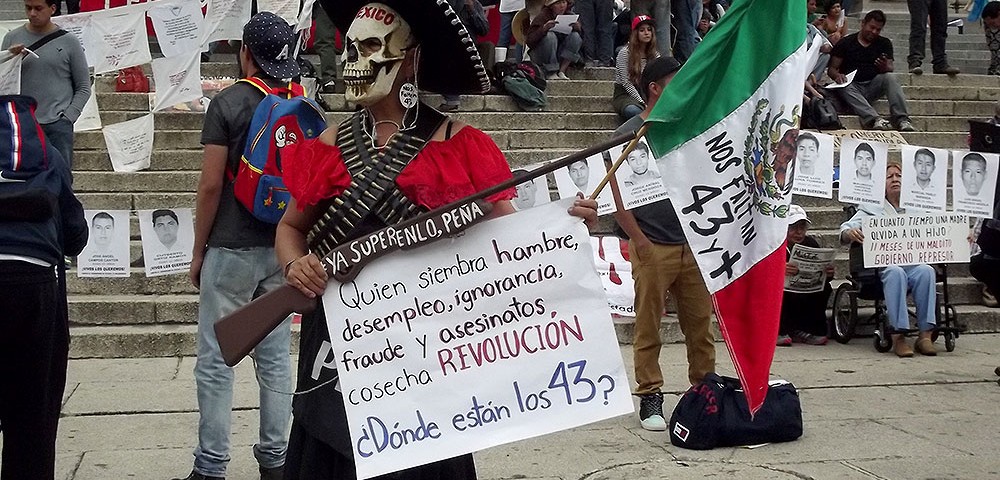2015
11/04/2016
LATEST: Pope Francis’ Visit to Mexico – A Word to the Wise is Enough
02/06/2016Beginning of January: The director of Tlachinollan Human Rights Center, Abel Barrera, confirms that the team of experts of the Inter-American Commission for Human Rights (IACHR) will analyze the investigation of the massacre and forced disappearance of the students of the Raul Isidro Burgos Teacher Training School on September 26, 2014, in Iguala.
January 22: Erika Guevara Rosas, Regional Director of Amnesty International for the Americas, claims at a press conference that the Attorney General of the Republic has failed to adequately investigate reports of complicity by the armed forces and other authorities in the forced disappearance of the 43 student teachers from Ayotzinapa.
January 26: The Third Federal District Judge rules that the penitentiary authorities did not justify the reasons that motivated the transfer of Antonio Suastegui Muñoz, spokesperson for the Council of Ejidos and Communities Against La Parota dam, to the maximum-security prison at Tepic, Nayarit. He therefore orders his return to La Union prison in the in the municipality of Isidoro de Montes de Oca, Guerrero.
January 28: The Inter-American Commission for Human Rights (IACHR) asks the Mexican Government to guarantee medical attention for the activist Nestora Salgado, member of the Olinala Community Police, Guerrero, detained in Tepic federal prison, Nayarit.
Mid-February: Civil society organizations demand from the Secretary of the Interior, Miguel Angel Osorio Chong, that the Mexican State protects Norma Mesino Mesino, human rights defender from Guerrero and leader of the Campesino Organization of the Southern Sierra.
February 25: The German commissioner for human rights, Christoph Strässer, and the German Ambassador, Viktor Elbling, announced that their country is committed to not selling or supplying arms or security equipment to the Mexican Government after a visit to the Teacher Training School in Ayotzinapa.
February 25: The Government of Guerrero confirms the death of the teacher Claudio Castillo Peña from a cranial traumatism after a clash with the Federal Police and members of the State Coordinator of Education Workers in Guerrero in Acapulco on the previous day.
Beginning of March: The parents of the 43 students teachers disappeared in Iguala ratify their vote of confidence in the team of the Inter-American Commission for Human Rights (IACHR), which begins to revise the case at the start of March.
March 23: The first report of the Interdisciplinary Group of Independent Experts (IGIE) indicates that the disappearance of the 43 students in Iguala on September 26 and 27 is a crime against humanity.
March 31: The spokesperson for the Council of Ejidos and Communities Against La Parota dam, Marco Antonio Suastegui Muñoz, returns to La Union prison, Guerrero State, after being transferred to Tepic maximum-security prison, Nayarit, where he had been imprisoned since June 2014.
April 21: The Supreme Court of Justice of the Nation begins a discussion on the sentence of the Inter-American Commission for Human Rights, which, in August 2010, condemned the Mexican State for human rights violations against Valentina Rosendo and Ines Fernandez, indigenous women who were sexually abused by soldiers in Guerrero in 2002.
April 26: Seven months after the disappearance of the 43 students from the Teacher training Center in Ayotzinapa, some 400 people place an anti-monument in Mexico City to recall that this state crime remains unpunished.
April 31: The New Alliance Party (PANAL) reports the murder of four members who were returning from a campaign meeting in Ixcapuzalco, municipal capital of Pedro Ascencion in the north of the state.
May 1: A group of hitmen murder Ulises Fabian Quiroz, Institutional Revolutionary Party (PRI) candidate for mayor of Chilapa in the coming June 7 elections.
May 5: The coordinator of the Olinala Communitary Police, Nestora Salgado Garcia, prisoner in Tepic federal prison since August 2013, begins a hunger strike due to the lack of progress in her trail.
May 18: The security guard of the offices of El Sur is beaten by armed men, who insistently ask him for “the manager” of the newspaper.
May 27: Inhabitants of Papaxtla, municipality of Chilapa, Guerrero, and members of the Regional Coordinator of Community Authorities (CRAC) report violent breaking and entering at seven homes in the community by some 50 elements of the Attorney General’s Office (PGR) and of the Federal Police (PF).
May 29: After 17 months in solitary confinement at Tepic Federal Prison, Nayarit, Nestora Salgado is transferred to the Tepepan Women’s Center for Social Re-adaptation in Mexico City.
June 5: After 31 days on hunger strike, Nestora Salgado Garcia, coordinator of the Olinala Community Police, ends her protest after the Governor of Guerrero commits to negotiating her release.
June 7: With a 41 percent lead, the close of the Program of Preliminary Electoral Results (PREP) for Guerrero State places the PRI-PVEM alliance candidate, Aector Astudillo Flores, as the virtual winner of the election.
Mid-June: Nestora Salgado Garcia, ex-commander of the Olinala Community Police, is informed by the Attorney General of Guerrero that there are three new accusations against her of alleged crimes of kidnapping, theft and homicide.
June 28: Twentieth anniversary of the murder of 17 campesinos and 23 wounded, all members of the Campesino Organization of the Southern Sierra (OCCS), by the Guerrero police.
July 7: One month after the murder of Antonio Vivar Diaz, activist of the Guerrero Popular Movement (MPG), some 2,000 teachers, pensioners and neighbors of Tepayec march in Tlapa to demand justice and punishment for the culprits.
July 9: The families of the missing 43 students from Ayotzinapa, along with their representatives, hold a meeting with the Attorney General of the Republic, Arely Gomez. It is the first meeting since Gomez is sworn into this position and after four months of a breakdown in communication between the families and the authorities.
End of July: Following the review of information and evidence of the Iguala Case file, the head of the National Commission for Human Rights (CNDH), Luis Raul Gonzalez Perez, declares the investigation into the disappearance of the 43 student teachers from Ayotzinapa carried out by the Attorney General of the Republic (PGR) “incomplete” ten months after the events.
July 22: Representatives of the Regional Council of Agrarian Authorities for the Defense of Territory (CRAADT) from La Montaña and Costa Chica of Guerrero demonstrate for the definitive cancellation of the exploration and exploitation of mineral resources by transnational companies.
August 2: The Jose Maria Morelos y Pavon Human Rights Center (Centro Morelos) publishes an Urgent Action message for the lives of Iguala activists Evelia Bahena, Diana Carolina Brito and Felix Rodríguez, who have been threatened with death after leading the struggle against the Media Luna mining company and for the defense of the lands where the Tlachinollan colony is located.
August 26: 41 years after the forced disappearance of Rosendo Radilla Pacheco, his family continues the search tirelessly. There was an event in front of the Attorney General’s Office in the Federal District to continue to demand justice in the case.
August 29: The Tlachinollan Human Rights Center celebrated its 31st anniversary in Tlapa de Comonfort city, Guerrero, with the participation of some 3,000 people. It dedicated its report titled “From the Trenches of Ayotzinapa, the Defense of Education and the Life of the Children of the People” to the mothers and fathers of the 43 missing students from the Isidro Burgos Teacher Training School, Ayotzinapa.
September 6: During the presentation of its report after six months, the Interdisciplinary Group of Independent Experts (IGIE) of the Inter-American commission for Human Rights determines that the student teachers from Ayotzinapa were not cremated at the Cocula dump as the Attorney General of the Republic had reported at the start of the year.
September 24: The families of the 43 missing students hold a meeting with President Enrique Peña Nieto (EPN) in the Federal District, where they present eight demands to continue the investigation. According to statements from Vidulfo Rosales, attorney for the families, “there was a crossed dialogue in the meeting in which none of the parts reached agreement and even, at the end, the meeting was bitter.”
September 26: There are demonstrations in a number of cities of the country and abroad to commemorate the forced disappearance of the 43 students from the Isidro Burgos Teacher Training School, Ayotzinapa, Guerrero, on September 26 the previous year and to demand justice in the case.
October 26: Thirteen months after the forced disappearance of the 43 student teachers from Ayotzinapa, the mothers and fathers of the disappeared march in Mexico City from the Angel of Independence monument to the Juarez monument to demand the return of their children.
November 4: The body of Julio Cesar Mondragon, the student teacher from the Ayotzinapa Teacher Training School who was tortured and murdered during the events of 26 and 27 September, 2014, in Iguala, Guerrero, is exhumed for a new autopsy.
November 11: Eight buses with 150 student teachers from the Isidro Burgos Teacher Training School are intercepted by members of the federal police, state police, ministerial police and the army on the Chilpancingo to Tixtla road, leaving 20 students wounded and 13 arrested.
November 27: The burial takes place of four members of the First House of Justice, La Patria, of the Regional Coordinator of Community Authorities-Community Police, murdered the day before in the city of Tixtla by suspected members of organized crime.
December 1: Following a three-day sit-in near Los Pinos presidential residence in Mexico City, mothers and fathers of the 43 students disappeared in Iguala, Guerrero, end their protest following the commitment of the Attorney General, Arely Gomez, to create a new Specialized Investigation Unit.
December 7: Fourth anniversary of the disappearance of the leaders of the Organization of Ecologist Campesinos of the Petatlan Sierra and Coyuca de Catalan, Eva Alarcon Ortiz and Marcial Bautista Valle.

